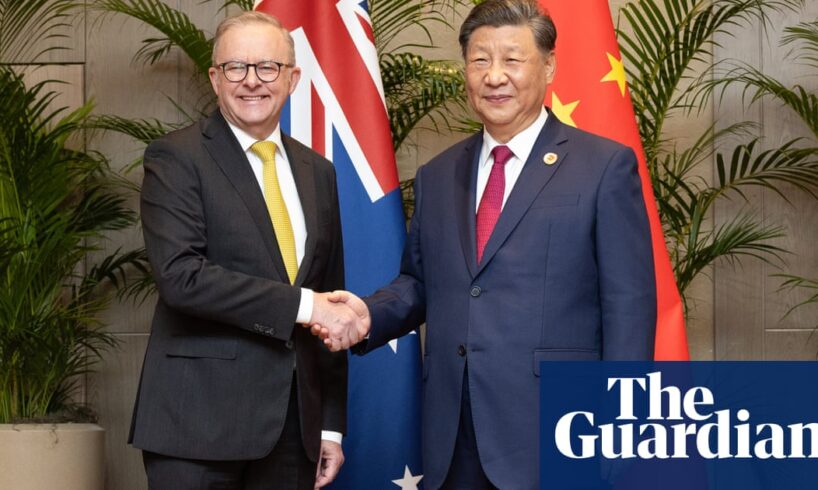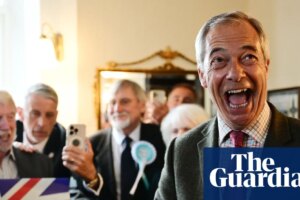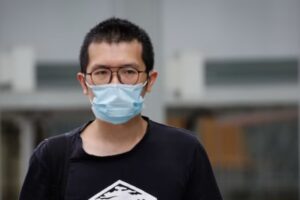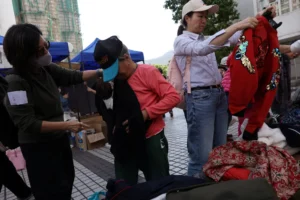
Anthony Albanese departs for his second trip to China with the spectre of Donald Trump looming large over meetings with Xi Jinping.
While the prime minister flies to Beijing to strengthen economic and diplomatic ties with Australia’s largest trading partner, a nervous eye must stay on the US’s promised Aukus nuclear submarines: military commitments of hundreds of billions of dollars, spending spurred by China’s own military buildup, now under review by the US defence department. According to some reports, they are a potential bargaining chip from a Trump administration seeking guarantees of support in any conflict over Taiwan.
Albanese will take a business delegation to the cities of Shanghai, Beijing and Chengdu for a six-day trip from Saturday. His official itinerary is about meeting business, tourism and sport representatives “to continue building on Australia’s strong economic and trade links with China”. That includes the Australia-China annual leaders’ meeting, attending a Shanghai soccer club with strong ties to Australia, a visit to the headquarters of Trip.com and likely a photo op with pandas.
President Xi and Premier Li Qiang are on Albanese’s meeting list – whether Li repeats his warm praise from 2023 of Albanese as “a handsome boy coming from Australia” remains to be seen.
Australia’s two-way trade with China amounted to almost $312bn in 2024 – by far our biggest partner, the government has been keen to stress, noting Albanese’s success in overseeing the removal of $20bn in trade barriers and boosting exports of barley, lobster and beef. Efforts to “advance Australia’s security and economic interests” are the flavour of the trip, government sources say, and for the business delegation, led by the Business Council of Australia (BCA), that will be top of their list.
Executives from banks, including ANZ and Macquarie, miners Rio Tinto and Fortescue, manufacturers BHP and BlueScope, and universities Monash and UNSW will join the prime minister’s trip. Heading their agenda is a CEO roundtable in Beijing, hosted by the China Development Bank, with an emphasis on green metals, research and development, education, finance, and clean energy.
BCA CEO Bran Black said businesses were keen to find new opportunities with China, seeking “an even stronger relationship with our largest economic partner”.
But advancing Australia’s security interests, as the government has also put at the top of its priority list, will call for a fine balancing act.
The Coalition has urged Albanese to raise the circumnavigation of Australia by a Chinese naval taskforce and advocate further for the release of detained academic Yang Hengjun. Human Rights Watch, noting human rights were not listed on Albanese’s list of trip priorities, called on the prime minister to raise abuses in Hong Kong, Xinjiang, and Tibet.
skip past newsletter promotion
Sign up to Breaking News Australia
Get the most important news as it breaks
Privacy Notice: Newsletters may contain info about charities, online ads, and content funded by outside parties. For more information see our Privacy Policy. We use Google reCaptcha to protect our website and the Google Privacy Policy and Terms of Service apply.
after newsletter promotion
But broader strategic concerns may prove the pivotal part of Albanese’s visit.
The foreign minister, Penny Wong, in an important speech in Malaysia on Thursday, while attending the Asean (Association of Southeast Asian Nations) summit, spoke of the “worrying pace of China’s nuclear and conventional military buildup, without the transparency that the region expects”. In the same breath, she praised China’s strength, saying its “size and weight makes it central to solving global challenges”.
That Wong, intensely deliberate and the closest of Albanese’s confidantes, would make such remarks on the eve of his visit to China was no mistake. Albanese, asked about her statement on Friday, said Wong was doing “a fantastic job”.
Wong’s speech, referencing the tensions between China and the United States, said, “Two countries can be the strongest of allies without agreeing on every single element of policy.” She said Canberra and Washington were “in complete agreement on the importance of the peace, stability and prosperity for the Indo-Pacific and for our peoples”.
Albanese’s Beijing visit will not go unnoticed in the White House. Conservative criticism of the absence of a meeting with Trump has been overblown, and is unlikely to abate after a second meeting with Xi. But Albanese will toe a fine line as he pursues closer ties with China while continuing to strongly maintain to the US that Australia needs the Aukus submarines.
Labor senator Raff Ciccone, chair of the parliament’s security committee, said on Friday that the two issues could coexist.
“When there’s trade, when there’s dialogue, when there’s economic interests at play, what you do find is countries are less likely to engage in the worst case scenario, which is war, and we’re trying really [to] have those frank conversations,” he told the ABC.





